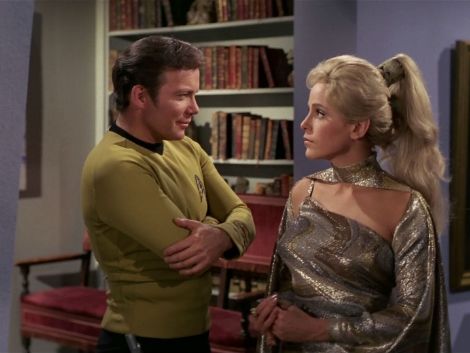I have trouble figuring out who Kirk is sometimes. I'm not writing a story, but if I were I'd have to think hard about what Kirk is all about.
The other characters are pretty easy to define:
Spock was based on clearly stated traits, being logical and unemotional, and then Nimoy added some schtick (neck pinch, mind meld, hand salute). If you're writing STAR TREK, you know who Spock is.
McCoy is a slightly-Southern country doctor, has some old-fashioned sentiments and gripes that serve to highlight the futuristic trappings, and he also comes in as Spock's comic foil, harboring opposite personality traits.
Scotty and Chekov are heavily accented speakers and sometimes quite excitable. Scotty can fix anything and he drinks; Chekov thinks Russia is the greatest and he's still in need of lessons from his superiors. If Scotty tries to defend a girl, a powerful entity sends him flying (Who Mourns, Changeling, Zetar). Chekov doesn't do much better when the gloves come off (Tribbles, Spectre).
Sulu and Uhura get some traits started, in Man Trap and Tribbles, respectively. It doesn't really go anywhere for them, but they play such functionary roles that it doesn't matter much.
But Kirk? Apart from always having the best wild hunches and the best luck with longshot strategies, who is he? He seems to be defined by what he does in a given episode rather than a fixed personality.
Who is this guy, as a fictional character? When the movies got started, it seemed that Shatner had changed, and Kirk along with him. And Chris Pine of course is nothing like either of Shatner's Kirks. The character seems very open to interpretation.
The other characters are pretty easy to define:
Spock was based on clearly stated traits, being logical and unemotional, and then Nimoy added some schtick (neck pinch, mind meld, hand salute). If you're writing STAR TREK, you know who Spock is.
McCoy is a slightly-Southern country doctor, has some old-fashioned sentiments and gripes that serve to highlight the futuristic trappings, and he also comes in as Spock's comic foil, harboring opposite personality traits.
Scotty and Chekov are heavily accented speakers and sometimes quite excitable. Scotty can fix anything and he drinks; Chekov thinks Russia is the greatest and he's still in need of lessons from his superiors. If Scotty tries to defend a girl, a powerful entity sends him flying (Who Mourns, Changeling, Zetar). Chekov doesn't do much better when the gloves come off (Tribbles, Spectre).
Sulu and Uhura get some traits started, in Man Trap and Tribbles, respectively. It doesn't really go anywhere for them, but they play such functionary roles that it doesn't matter much.
But Kirk? Apart from always having the best wild hunches and the best luck with longshot strategies, who is he? He seems to be defined by what he does in a given episode rather than a fixed personality.
Who is this guy, as a fictional character? When the movies got started, it seemed that Shatner had changed, and Kirk along with him. And Chris Pine of course is nothing like either of Shatner's Kirks. The character seems very open to interpretation.





